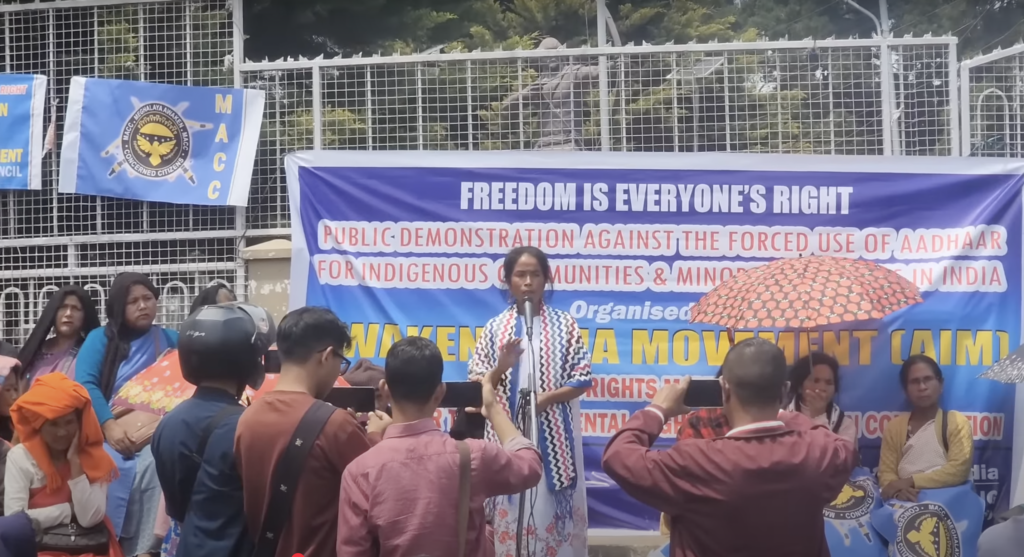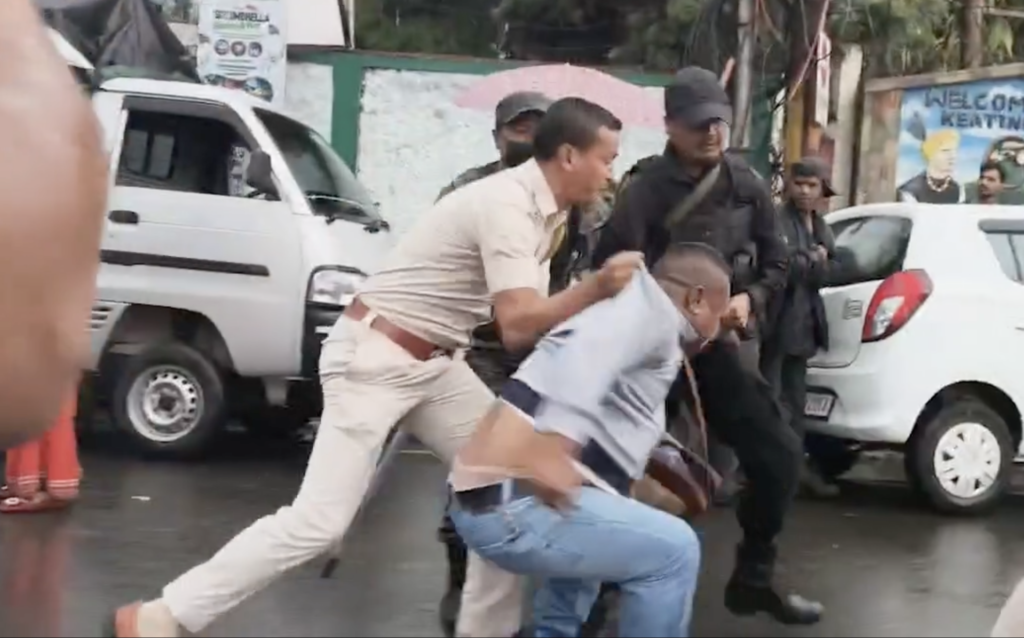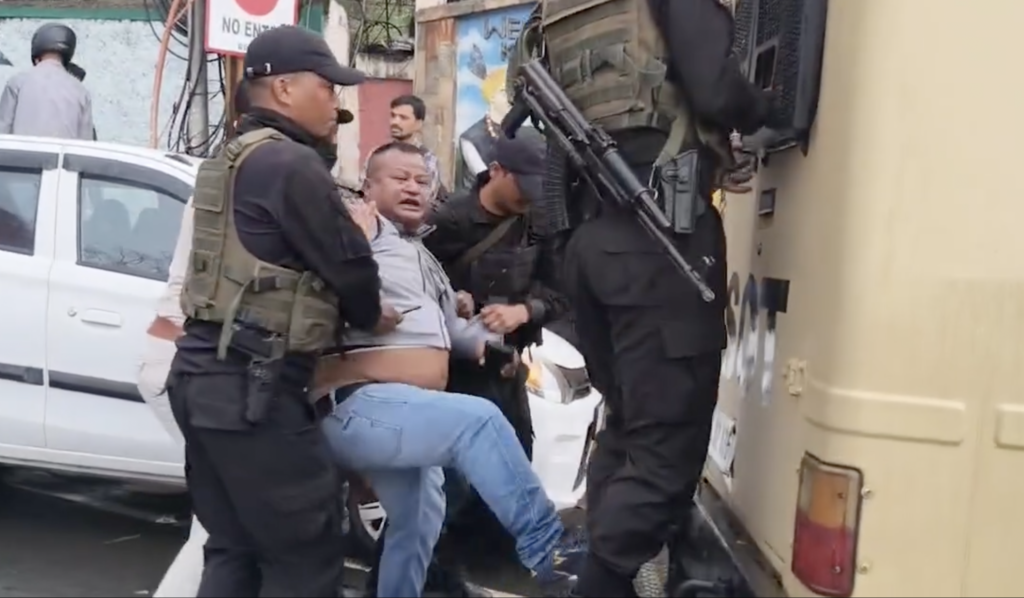Highlights
• AIM, Meghalaya state committee, has set a seven-day deadline for the state government to respond to its insistence on Aadhaar card seeding.
• Protesters staged a protest against the government’s insistence on Aadhaar card seeding for various government benefits.
• Tensions escalated when protesters attempted to march towards the Secretariat to submit a memorandum to the state government.
• AIM representatives met with East Khasi Hills Deputy Commissioner R.M. Kurbah to voice their concerns.
• AIM Banshai Marbaniang, clarified that AIM is protesting against the government’s attempt to force people to enrol for Aadhaar.
• AIM leader accused the government of threatening benefits to people without Aadhaar.
• If the state government fails to respond, AIM plans to approach the High Court or Supreme Court for justice.

The Awaken India Movement (AIM) held a public rally in Shillong to protest against the reported forced registration of Aadhaar names. The protest, which was held in front of the statue of Woh Kiang Nangbah opposite the Civil Hospital, drew hundreds of state residents who gathered to express their opposition to the government’s move to force citizens to register for Aadhaar.
Addressing the gathering, AIM Banshailang Marbaniang stressed the need to protect the rights of all citizens to resist coercion. He urged the people to remain firm and resist the government’s intentions, exercising their right to protest against any coercive actions. AIM Banshai highlighted the role of elected officials, stating, “We have elected the MLAs. This road belongs to us, the Secretariat belongs to the people – no one has the power to own it.”
“We don’t have true leaders anymore — only selfish people,” he added

North Shillong MLA Bah Adelbert Nongrum, who joined in the protest, stressed, “No one shall be forced to get registered for Aadhaar, not even in school or colleges.”. He hoped that the state government would address the concerns raised by ethnic groups at the central level, and he believed that people should be free to opt whether to register or not. Nongrum brought attention to the role of Aadhaar in politics and elections, asking, “If Aadhaar is really important, why is there no law to ban people who do not have Aadhaar from voting?”
Referring to the suspension of the Voice of the People Party (VPP), Nongrum reasserted his commitment to serving the people’s voices regardless of the party’s actions. He stood firm in his position, saying, “I did nothing wrong. If I have erred, I will apologize. But they don’t want to forgive because they only want believers. I won’t give way to any power in the name of the Voice of the People party or a clean world. My loyalty is only to God.”
AIM Banshai Marbaniang pointed out, “The Supreme Court has made it clear that Aadhaar is not compulsory in states such as Meghalaya, Assam, and Jammu & Kashmir. Therefore, it should be the choice of the people whether they want to sign up for Aadhaar. Forcing them to do so is unacceptable in a democratic society.” He also accused the government of threatening to withhold benefits from various groups, including students, ASHAs, Anganwadi workers, MGNREGS job card holders, and pensioners, if they do not possess Aadhaar.
“In view of this, we have decided to serve a seven-day ultimatum to the state government to resolve this issue failing which we will approach the High Court or Supreme Court (for justice),” AIM Banshai said.
As demonstrators attempted to march towards the Meghalaya Secretariat to submit a memorandum to the Chief Minister, they were intercepted by police and district officials. This intervention led to heightened tensions among protesters when one member was taken away by police for continuing the demonstration despite being stopped.


The situation shows a wider dissatisfaction among certain groups of people about the way Aadhaar policies are carried out. Many feel that these rules make it more difficult to access essential services rather than helping them.
Citizens have several legal rights when protesting government policies such as the Aadhaar linkage, primarily grounded in constitutional protections and international human rights standards. These rights include:
1. Right to Freedom of Speech and Expression
Under Article 19(1)(a) of the Indian Constitution, citizens have the right to freedom of speech and expression. This includes the right to express dissent against government policies, including protests against mandatory Aadhaar linkage. This right is fundamental for a functioning democracy and allows individuals to voice their opinions publicly.
2. Right to Assemble Peacefully
Article 19(1)(b) guarantees the right to assemble peacefully without arms. Citizens can gather in groups to protest against government actions or policies, including those related to Aadhaar. However, this right is subject to reasonable restrictions under Article 19(3), which allows the state to impose limitations for reasons such as public order or national security.
3. Right to Privacy
The Supreme Court of India recognized the right to privacy as a fundamental right in its landmark judgment in K.S. Puttaswamy v. Union of India (2017). This ruling implies that citizens have a legal basis to protect their personal data from being misused by government surveillance during protests, especially concerning biometric data linked with Aadhaar.
4. Protection Against Arbitrary Arrests
Under Article 22 of the Constitution, citizens are protected from arbitrary arrest and detention. If individuals are arrested while protesting against Aadhaar linkage, they have the right to be informed of the grounds for their arrest and consult a legal practitioner of their choice.
5. Right to Seek Judicial Remedies
Citizens can approach courts if they believe their rights are being violated during protests. They can file Public Interest Litigations (PILs) or individual petitions challenging unlawful actions by authorities, such as excessive use of force or violation of their rights during protests.
6. International Human Rights Standards
India is a signatory to various international treaties that protect civil liberties, including the International Covenant on Civil and Political Rights (ICCPR). This treaty reinforces citizens’ rights to peaceful assembly and freedom of expression, providing an additional layer of protection for protesters.
The Awaken India Movement protests against forced aadhaar registration in Shillong, highlighting the importance of upholding individual rights and freedoms. Stand up and speak out!
Also Read:
